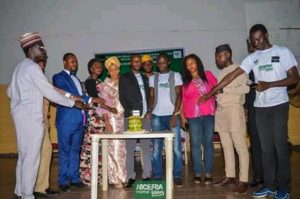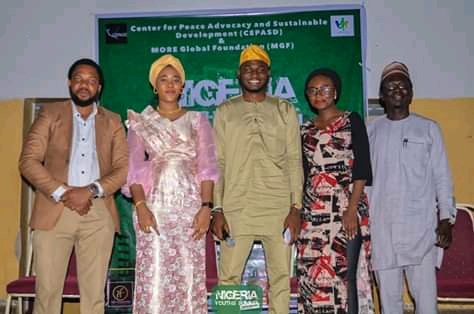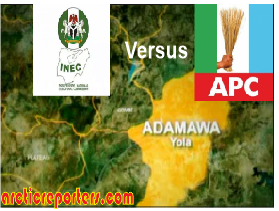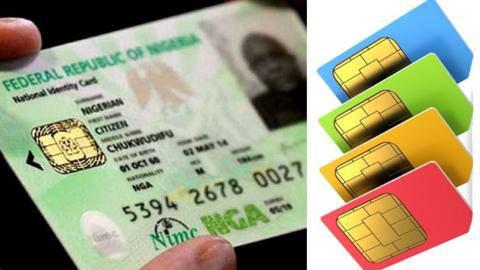REPORT OF NIGERIAN YOUTH SUMMIT 2019
HELD AT EDUCATION RESOURCE CENTRE
ON THE 29th AUGUST.
THEME: TRANSFORMING EDUCATION.
The program started with the registration of participants at exactly 9:01AM with a total number of 137 persons in attendance and followed was the opening prayers taken by Olajuwon Timileyin Gabriel at about 10:32am and afterwards the second stanza of the National Anthem was led by Tobi Emmanuel at about 10:35AM. Martin Marry, an ex-dancer and a public health advocator who spoke on ‘what it takes for education to be transformed in Nigeria’ explained that in transforming education, collaborative ideas, team work, precision, passion and togetherness are needed. He linked this scenario to Nigeria where there is unity in diversity and as such concluded that education in Nigeria is a common goal which requires the effort of everyone and sectors in order to achieve the desired result.
Welcome speeches were wittly delivered by the convener Igweshi Augustine, he stated that the goal of the summit is to build a framework and advocacy network of young people to drive for increase budgetary allocation of 20% to education and inclusion of people with disability in education and governance. He also stated in other to drive this advocacy there will be an hashtag to propel the advocacy movement. He stated that the hashtag is #20%ForEducation. This hashtag is going to be used to drive the advocacy movement for increase budgetary allocation of 20% for education. He advice the participants to start using the hashtag on the various social media handles.

Hon Musa Olatunji a co-convener also delivered his speech respectively and followed shortly afterwards was the keynote speech delivered by Dr Macjohn ably represented by Mr kenneth at about 11:28am. His presentation tagged “Transforming Education” was tailored around the importance and challenges facing the education sector in Nigeria and possible recommendations were proffered. He asserted that education is the key to technology, innovation, social cohesion, development and nation building and as a result, all hands must be on deck towards promoting positive education in Nigeria. While highlighting some basic challenges facing Nigeria education sector, he pointed out human capacity, political will, resource mobilization, technology and many more. He also pointed out that some of the major consequences of this include but not limited to 1. High Unemployment and 2. Threat to social cohesion. He however submitted ‘in order to transform education in Nigeria, we must focus on addressing the challenges and bring about practical, feasible and visible solutions’. Dr Macjohn concluded by recommending the following as possible ways of changing the face of
Nigeria Education: Policy design and implementation, provision of infrastructure, continuous development and training, entrepreneurship education and application of technology.
Mr. Gideon Olanrewaju, a contributing speaker who spoke on ‘Youth Involvement and Engagement in Transforming Education’ postulated that it is highly imperative that every individual in Nigeria starts to work towards transforming education in Nigeria because little is what government can really do. He quoted that it is the collective responsibility of today’s generation to make sure upcoming generations have access to quality education. He noted that there are five major components of education which Nigeria education sector must put into view; these are 1. Access 2. Quality 3. Equity 4. Inclusion and 5. Rights. He also noted that we need to develop an informal education that can promote the society, environment and education as postulated by SDGs. He pointed that globally, there are over 250million primary school children who are in school but cannot read and write and about over 60million out-of-school children in Africa.
He recommended three (3) tools needed in order to bring about transformative education in nigeria: Innovation, Collaboration and Technology. He concluded on the note that the following four (4) things are required in order to transform Nigeria education: Improve budgetary allocation, radical innovation through PPP, Quality teaching standard and well trained and motivated teachers, and alternative emergency educational model. Prof. Blessing Lawal; another contributing speaker spoke on education as an instrument to promote peace and development. He also added that maginalization and issues of tribalism and inequality should be eradicated in Nigeria so as to bring about peace, development and growth. He submitted that Youths involvement in politics should be looked into as politics is a tool to developing education. He emphasized the needs for youths to be at the fore-front of policy making.
Another enthralling session of the program was a panel discussion which was anchored by Ambasssador Opeloyeru Adams. The panelist include: Ambassador Graham Elendu, founder: Role Model Initiative and Media Director (CEPASD), Alima Nuradeen, founder: NOPDER, Aminat Usman Esq: Education Researcher and Youth Activist. The panel session which was interactive and engaging had some questions channeled to the panelists which include: How can we engage the government official through the media to manage and transform the educational sector at both local and federal levels? Ambassador Graham responded by saying that social media influencers, NGOs, and the general public should be at the fore-front to achieving this through social media. He’s also of the opinion that the budgetary allocation for education is relatively low, he thinks that the budget for security should be channeled into education, job creation and infrastructure because an educated society or community would have less crimes since the youth would have tangible things to keep them engaged, hence, leading to less crimes. He concluded by saying, youths have to be involved in politics and we have to keep talking and continue advocacy.
The second question was directed to Halima Nuradeen and its on challenges facing students in transforming education and possible solutions? In responding to the question, she said that lack of understanding of the teachers on the concept of education, contents being taught, lack of qualified teachers, not enough schools, and non-state actors engagement are key problems. She also emphasized that accountability of funds available, using corp members who are not interested in teaching, lack of conducive environment, students being sent out of school because of fees is also a major problem. In conclusion, she mentioned that, teaching involves passion and it is humanitarian and to achieve quality education, it must be a collaborative effort by the government and the people.
The third question was directed to Amina Usman Esq, what are the policies to put in place to achieve quality education in Nigeria? She responded by saying there are enough policies, conferences, summits etc, talking about education but there is no implementation, so in a nutshell, implementation is the problem. Therefore, there is the need for constructive and productive consultation and implementation, constant assessment and check up on education sector, mass enlightenment, awareness on social media, expansion of schools and provision of learning platforms and materials e.g good library, books etcetera. In the same vein, Amb Aboh Lubem also submitted that it is necessary to incorporate Industrial Technology, life-saving skills and vocational education in school system to achieve sustainable development.
Poetry, storytelling and narrative by Sabiqah Bello, Umaru Zayyanu Bilya and Bassey Bassey was another fascinating aspect of the event. Mr. Bilya of the Nigerian National Association of the Deaf (NNAD) said, persons with disabilities are those that suffer most in the society, being neglected and not getting involved in most activities. He also added that there are people with disabilities who are parents, teachers, mentors, etc, who are finding it hard to make an impact in the society. He noted that the government should stop deceiving them with fake and false information, by speaking about jobs that don’t actually reach out to involve youths in making an impact. He said Nigerian Youths must voice out in order to address these issues. On a final note, he added that Political appointments such as SSA, PA, and the rest which are being given to the youths should be addressed such that, there should be standard policies that will be set to allow the voice of the youths who are passionate about nation building to be heard.
A speech was also delivered by Hon Hannat Alasa, chairperson Environment and Climate Change Democracy Africa Youth Parliament on behalf of Rt. Honorable John Aggrey, speaker of Parliament second assembly democracy african youth parliament. The speaker commended the organizers of the program for putting up a wonderful initiative like this. He expressed his pleasure to be part of this year’s event. He gave a summary about democracy african youth parliament and their obligations. He went ahead to highlight the problems being faced by quality education and proffered solutions like youth involvement and poverty alleviation. He concluded by encouraging the youths to always bear in mind people across the globe without access to energy, food, healthcare, clean water and many other basic requirements we take for granted. Part of the event also is the presentation of awards to some selected delegates as Peace Ambassadors. They are Hon. Augustin Igweshi, Hon. Halima Nuradeen, Hon. Adam Opeloyeru, Hon. Theresa, Hon. Joseph, Ambassador Maigari Blessing. As a sign of appreciation, goodwill messages were given by the newly inducted ambassadors. Furthermore farewell messages were delivered by Ambassador Halima Nuradeen and Tobi Emmanuel. Amb Nuradeen appreciated the organisers and also added that she believes the participants have learned a lot that will be used to make positive impact in our various communities. She encouraged that all the attendees should make sure they all work in their own way to ensure that education is transformed. Mr Tobi also tender his unreserved appreciation to the convener and the co-convener for their efforts in ensuring that the Nigerian youths are appreciated and also thanked everyone who made this event a success.
Vote of thanks was given by Grace Doo at about 3:23pm and the program came to a close at exactly 3:26pm with the closing prayer by Taiwo Odusote.
Compiled by: Alasa Hannat, Yakubu Umar Bagida, Timileyin Gabriel Olajuwon, and Lucky Babuje



It was a wonderful event and I am glad to be part of this great gathering of visionary youths